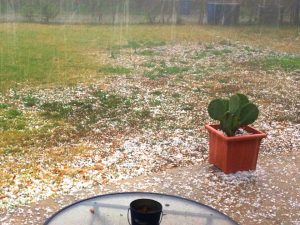Did your home suffer hail damage during the storms earlier this year? Many people don’t even know that their homes were affected by the hail storms and since they’ve experienced no leaks or obvious things like broken windows, they think they have escaped the major brunt of the storms and all is well. Many homeowners don’t know anything happened at all…until they go to sell their homes and the buyer comes along for the home inspection. If your home was in the path of one of the storms that brought with it extensive hail damage, chances are the inspector will find evidence of it and notate it in their report. Once it’s on that report, you’re going to have to deal with it one way or another.
Inspectors know what neighborhoods experienced hail damage and which didn’t, so they are on the lookout for the telltale signs of damage on rooftops. On composition shingle roofs, the hail typically leaves a mark upon impact, which removes some of the granules from the shingle and there is often a bit of a skid mark where they hit the roof and begin to slide down. Although these pockmarks can be small and seem insignificant in the grand scheme of things, they are an indication of long term wear and tear and while they may not be causing a leak now, they can cause issues in the future. Inspectors are there to report their findings to the buyer and because of the heightened awareness of hail in the area, they are looking at roofs more closely. Remember, the inspector has to protect their liability too – so when things like this become common place in an area, they are more likely to report these kinds of issues. They have to cover their liability and make everyone aware of the potential disclosure of items that could cause trouble for the owner – now or after the sale.
Once an inspector notates evidence of hail damage in their report, you’re stuck with it. As a seller, you now have a few basic choices:
-
- Do nothing. Most buyers are going to back out if you do nothing and if they did their inspections during the option period, there’s little recourse for you as a homeowner. This choice has an additional downside in that you now have to disclose that inspection report to future buyers on your Seller’s Disclosure Notice, so chances are just about every buyer is going to ask you to rectify the situation. It’s not just a matter of the buyer getting a new roof either – most insurance companies won’t insure the property for a new buyer because of the known damage. It truly is a case of being stuck between a rock and a hard place.
- Fix the roof and pay for it yourself. Depending on what the damage is, it may be a simple fix or it may be time to tear the whole roof off and replace it. Coming out of pocket for a new roof is not something most owners enjoy, so the next option is usually the better one.
- Call your insurance company and have them come out and inspect the roof. This can take time, so typically the seller and buyer will agree to extend the option period to allow time for an insurance adjuster to come out and present their findings. The insurance company will give you an estimate of what they think the damage is and how much it will cost to fix the roof or get a new one. Remember, the insurance company will take into account any depreciation of the value of the roof as well as your deductible, so while they may declare it a total loss in need of replacement, they won’t necessarily pay for the whole thing. Once you have your numbers, you can arrange to have the roof fixed. You may have to work with the buyer to change closing dates as most lenders will not close on the home until they can verify the work is complete.
- You can perform the steps above, but instead of arranging to have the roof work done and paying for it with your insurance claim, you can assign the insurance proceeds over to the buyer at closing. You will still be responsible for your deductible, but this puts the work into the hands of the new owner after the sale. There’s a catch however. Most lenders and insurance companies won’t allow you to do this. There are some that allow it, but in most of the cases we’ve seen this year, either the lender requires the work to be complete before they will close and fund the loan or the insurance company doesn’t allow for assignment of proceeds. The banks are protecting their asset and the insurance company is making sure that the work gets done and no one is just pocketing the money only to make a claim later for the same item. Also, the buyer’s insurance company may not insure the property because of their knowledge of the claim and may also insist the work is done before they will insure the home. Without insurance on the home, the lender will not close on the loan.
Whichever route you choose, you’re going to want to keep the buyers updated and informed and you will need to get them to come to an agreement with you on how to proceed. As always, you’ll want to get everything in writing and your agent will draw up and amendment to the contract to reflect the decisions made on how everything will be handled.
Do You Have Hail Damage?
Most homeowners don’t go up on their roofs very often to inspect them, so you may not even know you have hail damage. If the storms passed through your neighborhood, chances are you do, even if it is only slight damage. Telltale signs you may need to think about your roof? If you’re seeing roofers all throughout your neighborhood, signs in the yards for roofing companies, pallets of shingles stacked in driveways…you’re going to want to get your roof checked. Buyers and their agents will be looking for those signs as well as having the home inspected and chances are, some evidence of hail damage will be found.
If you’re thinking about selling and live in an area that did experience hail storms, you can call your insurance company beforehand and have them come out to inspect the roof. It will save a lot of time and hassle while the home is under contract and you can have the work started sooner rather than later. You’ll probably have to come out of pocket for some of it (at least your deductible), but doing it now can save you the hassle and headache later during the sale. If you decide to have the whole roof replaced, it can add value to your home as well, so you may wind up with better, stronger offers for more money, especially since many buyers are aware of the length of time it can take to get these problems resolved while the home is under contract and they may not be prepared to take on the challenge of those types of delays. A little preparation goes a long way.
image courtesy of cafuego




